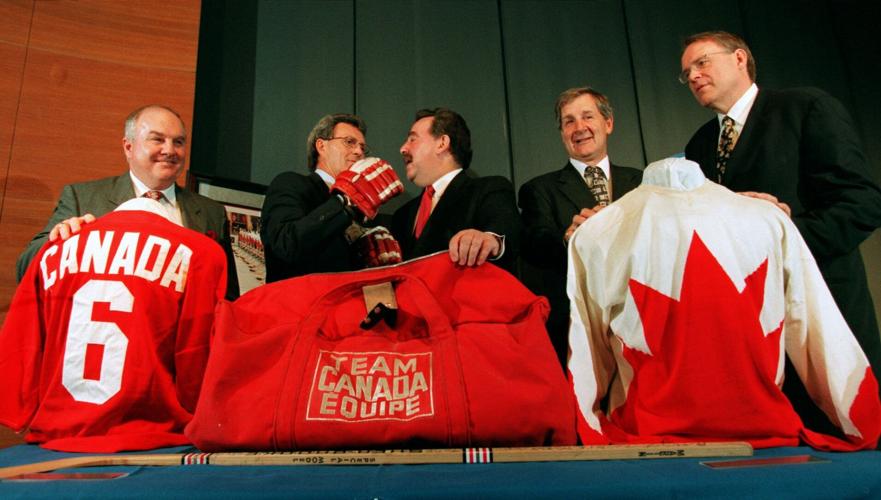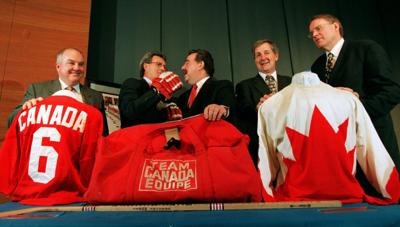It’s been called the day Canada stood still.
As noted on the , few Canadians alive on Sept. 28, 1972 were not glued to their televisions or radios as Canada and Russia squared off in the eighth and final hockey game of the iconic Summit Series. Of the 22 million Canadians, 16 million watched.
Before the start of the third period at a hockey rink in Moscow, with Team Canada trailing 5-3, Paul Henderson, one of the team’s star players, whacked goaltender Ken Dryden’s leg pads with his hockey stick.
“I said, ‘You board this thing up for us and we’ll beat them, but you cannot let another goal in,’ ” Henderson said with a rueful laugh Saturday, still reeling from the news that the Hall of Fame goaltender died Friday at the age of 78.
Ken Dryden, the Hall of Fame goaltender whose long resume in and out of hockey included six Stanley Cup victories and helping backstop Canada's generation-defining victory at the 1972 Summit Series, died Friday at the age of 78 after a battle with cancer. (Sept. 6, 2025)
The Canadian Press“It was an intense time. And I would say the best period he played in the whole series, because they (Russians) did not score and he made some incredible saves.”
Left-winger Henderson scored the winning goal with 34 seconds left in the game, a photo famously capturing him with his arms raised in the air.
“I’m glad he came up big in that third period, I’ll tell you that.”

Members of Team Canada in the 1972 Summit Series. From left, Peter Mahovlich, Frank Mahovlich, Yvan Cournoyer, Serge Savard, Ron Ellis, Ken Dryden and Paul Henderson.
Star Staff file photoHenderson was aware of Dryden’s cancer diagnosis. The two hockey legends last saw each other last February in Montreal at the┬á4 Nations Face-Off tournament with teams of┬áNHL players representing Canada, Finland, Sweden and the U.S. Canada. The Canadian team was victorious, winning over the U.S. in the final game.
“He looked fabulous,” Henderson, 82, said Saturday in an interview from his Mississauga home.
“Eleanor (Henderson’s wife) and I probably spent 45 minutes with him, just the three of us in the lobby of the hotel, and talked about a lot of things,” Henderson said.
“When Eleanor told me this morning, I said ‘You’ve got to be kidding,’” he said about Dryden’s death. “Anyway, cancer is cancer,” said Henderson, who has spoken publicly about his own cancer battle.
While catching up in Montreal last winter, the two men, both Ontario natives, shared memories about the iconic 1972 hockey series.
Henderson remembered something Dryden said to him while they chatted.
” ‘You know Paul, when you scored, that’s the first time I ever skated down the ice and wanted to be part of a celebration of a goal scored, ’ ” Henderson recalled┬áDryden┬ásaying, before adding that he suddenly realized there was still time left on the clock so he had to “settle down.”
During their National Hockey League careers, the two were never on the same team. Henderson played for the Detroit Red Wings, ║úŻă╔šă°╣┘═°Maple Leafs and Atlanta Flames, while Dryden spent his whole NHL career (1971-1979) with┬áthe Montreal Canadiens, helping the team win the Stanley Cup six times.
“I hated playing against him, that’s when they were so good,” Henderson said. “But I admired him, I think everybody did.”
Henderson’s admiration for Dryden continued long after their hockey careers ended. Dryden went on to become a lawyer, a politician, an author and president of the ║úŻă╔šă°╣┘═°Maple Leafs, among other things.
“He was just a straight-up guy. When he told me something, I believed it, and ... I can’t say that about everybody.”
Dryden, who shared net-minding duties during the ‘72 Canada-Russia series with Tony Esposito, detailed his version of events in his book,┬á “The Series: What I Remember, What it Felt Like, What it Feels Like Now.”
A summary of the book, published in 2022, calls the series “one of the most important in hockey history, changing the game, on the ice and off, everywhere in the world.”
Dryden wrote that he recalled little of the first game.
“I don’t remember flying to Montreal. I don’t remember the dressing room,” he wrote. “All I remember is a feeling that kept building and building and building, growing and growing. It’s what happens before a Stanley Cup series, before a Stanley Cup final, but not like this.
“It built to where it couldn’t build anymore, grew to where it had no place left to grow, then it built and grew some more.”































To join the conversation set a first and last name in your user profile.
Sign in or register for free to join the Conversation